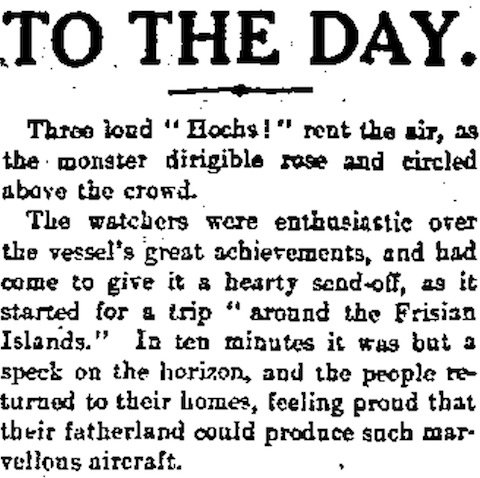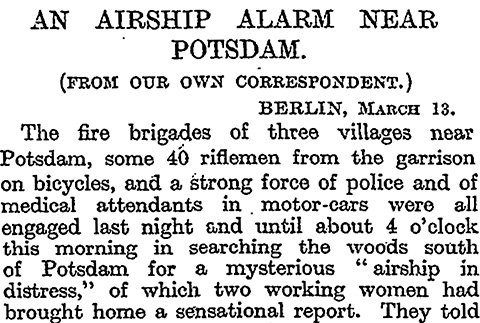Judging from the report in the Western Gazette, Captain Faber, Conservative MP for Andover, evidently is not convinced by the letter he received from the Prime Minister downplaying the mystery airship visits, for in a speech to his constituents at Weyhill in Hampshire he invoked them as a counterargument to the War Minister’s downplaying of airships in general (p. 11; above):
Turning to the question of airships, Captain Faber said that Germany and France were spending brains and millions of money on these ships, but whilst this was so, our incurable optimist said airships were of no use to us. Had we in this country a monopoly of brains? Were the airships lately over Sheerness and Grimsby of no use?
Faber ridiculed Colonel Seely’s suggestion that ‘he had a gun to defend these shores from airships’:
Was he going to have a gun every half-mile all round England, Scotland, and Wales, ready loaded, with a man always there to shoot? For it must be remembered that an airship travelled at the rate of sixty miles an hour.
He claimed that German experiments had anyway shown that ‘three hits from below made but little difference […] If the wound was inflicted at the top of the airship, it would be different and dangerous’. As for Seely’s idea that ‘airships were no good at night, because they could not see’,
Had he forgotten the bright lights of London and Liverpool, which were visible for many miles from above the earth, and the frightful consternation that would be caused by explosives dropped at night over any big town?
Faber also has some interesting information about one ‘foreign airship’ (presumably German, though why he doesn’t say so is unclear) in particular, contained ‘in a letter in his possession from an absolutely reliable source — from a passenger in this very airship’. It ‘covered 1,600 miles without a break in twenty-nine hours’ just ‘the other day’, and is ‘about half the length of the Mauretania, had a crew of twenty-eight officers and men, and cooking, dining, and sleeping rooms’. It also has advanced camouflage and navigational technology:
They could cover themselves at any moment with vapour cloud to stop dectection [sic]; they were always surrounded by prepared covering that prevent reflection, so that they could not be photographed; they carried maps that were unrolled by the steersman, showing all the country they travelled over. Goetz, the man who invented the Goetz lens, had contrived a patent which, with mirrors pointing downwards from either end, would record most accurately and minutely the survey of the country over which they passed. There were thirty-eight of these airships ready, and thirty on order. He gave these few details concerning foreign airships to open the eyes of the country to the menacing danger threatening us. (Cheers.)
The Gazette also carries a notice about the wreck of the Ersatz Z I over a week ago, noting that it was ‘the “fly-by-night” monster airship which is supposed to have recently visited England and created a scare’ (p. 5).
The word ‘scareship’ appears in an article in the Manchester Courier attacking complacency on the airship issue on the part of Liberals as a generic term rather than one referring to phantom airships specifically. The Radical press is accused of having
substituted the word scareship for airship, they regarded all our accurate information on airships capable of discharging tons of explosives as a figment of the imagination.
The Government is described as ‘until recently, case-hardened sceptics to whom “airships” and “scareship” are synonymous terms’, while Seely’s bizarre idea about airships not being able to see anything if they can’t be seen is described as ‘This is precisely the sort of reason which appeals irresistibly to the people who confound an airship with a “scareship,” but it is inexcusable levity in a Minister of War’ (p. 7). The Courier‘s larger argument is that
Aerial navigation has passed from the realms of imagination. Germany, by her splendid enterprise, has so developed the airship that the countries of the world must alter their whole methods of defence. The war of the future will be fought in the air. Diplomacy or bartering between nations succeeds or fails in proportion to the defensive forces possessed by those nations. And the coming of the airship affects no other country so vitally as Great Britain.
What is needed is ‘an Aerial Budget, with proper and adequate provision for our aerial needs’, and what is needed for that is ‘a great public agitation’, and so the Courier calls upon ‘the Aerial League, the Navy League, and those other bodies interested to press forward the campaign’.
![]() This work is licensed under a Creative Commons Attribution-NonCommercial-NoDerivatives 4.0 International License.
Permissions beyond the scope of this license may be available at http://airminded.org/copyright/.
This work is licensed under a Creative Commons Attribution-NonCommercial-NoDerivatives 4.0 International License.
Permissions beyond the scope of this license may be available at http://airminded.org/copyright/.



